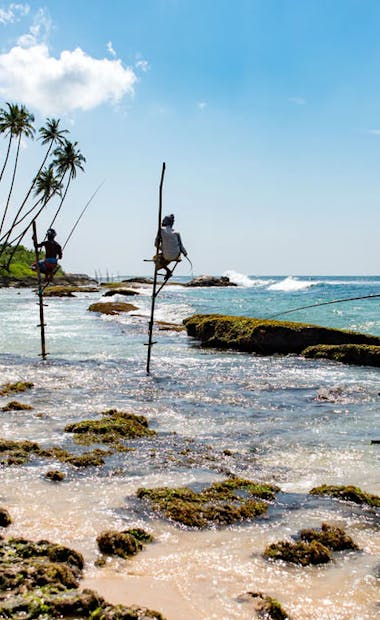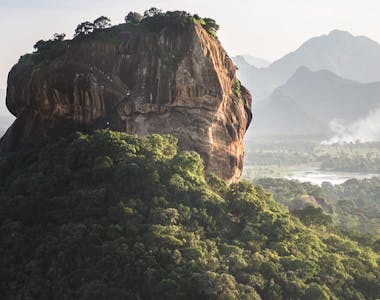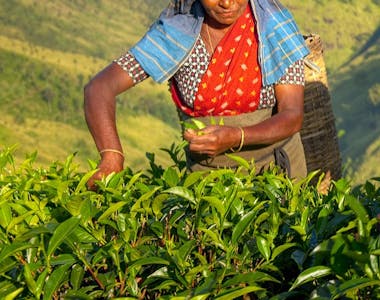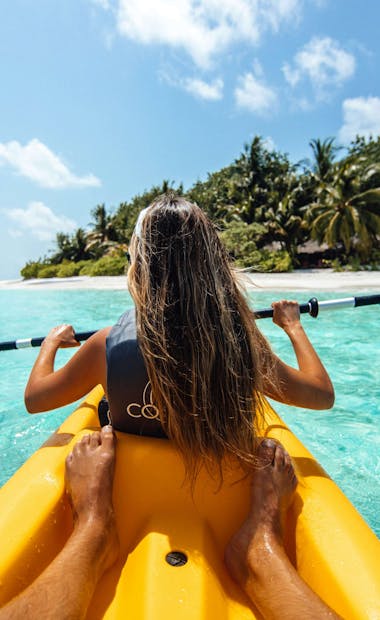
Sri Lanka Tours
Discover rain forests, national parks, mountains and beautiful beaches
Popular tours
- Save11%
 View Tour
View TourSri Lanka: Elephants, Temples & Ocean Trails - 12 Days
- Colombo to Colombo
- Age group: 18 - 55
- Max group size: 16
Was:£917From£812 - Save5%
 View Tour
View TourThe Sri Lanka Experience - 12 Days
- Negombo to Colombo
- Age group: 18 - 39
- Max group size: 22
Was:£1,107From£1,051 - Save12%
 View Tour
View TourActive Sri Lanka Adventure - 10 Days
- Negombo to Colombo
- Age group: 18 - 99
- Max group size: 16
Was:£1,051From£930 - Save30%
 View Tour
View TourSri Lanka: Spice Gardens & Seasides - 12 Days
- Negombo to Hikkaduwa
- Age group: 18 - 39
- Max group size: 24
Was:£829From£580 - Save11%
 View Tour
View TourSri Lanka Family Adventure - 10 Days
- Negombo to Colombo
- Age group: 6 - 99
- Max group size: 10
Was:£1,420From£1,257 - Save2%
 View Tour
View Tour13-Day Active Sri Lanka Tour: Surf, Raft, Hike
- Colombo to Colombo
- Age group: 18 - 55
- Max group size: 20
Was:£1,049From£1,033
Sri Lanka Tours
Welcome to the enchanting island of Sri Lanka! Nestled in the heart of the Indian Ocean, Sri Lanka is a hidden gem that beckons travelers with its rich history, vibrant culture, and breathtaking landscapes. Embark on a journey of discovery as you explore this tropical paradise on our carefully curated Sri Lanka tours.
Sri Lanka holidays offer an incredible tapestry of experiences, where ancient wonders meet pristine beaches and lush greenery. Step back in time as you wander through the ancient ruins of Polonnaruwa or Sigiriya, where magnificent rock fortresses and intricate carvings tell tales of a bygone era. Immerse yourself in the spiritual ambiance of the sacred city of Kandy, home to the revered Temple of the Tooth Relic, and witness the mesmerizing rituals of Buddhist ceremonies.
For nature enthusiasts, Sri Lanka boasts an astonishing array of biodiversity. Delve into the misty realms of the hill country, where emerald tea plantations carpet the rolling hills, and cascading waterfalls add a touch of magic to the scenery. Embark on a wildlife safari in one of the national parks, such as Yala or Udawalawe, where you can spot majestic elephants, elusive leopards, and a myriad of colorful bird species.
But Sri Lanka is not just about history and nature; it is a land of warm hospitality and vibrant traditions. Indulge your senses in the bustling markets of Colombo, where fragrant spices and vibrant textiles awaken your curiosity. Savor the tantalizing flavors of Sri Lankan cuisine, from aromatic rice and curry dishes to delectable street food that will leave your taste buds dancing with delight.
For those seeking relaxation and rejuvenation, the palm-fringed beaches that adorn the coastline are a true tropical haven. Unwind on the golden sands of Bentota, Mirissa, or Arugam Bay, where turquoise waters gently lap the shore, and the soothing sea breeze whispers secrets of serenity.
Our Sri Lanka tours are designed to cater to every traveler's desires, whether you're a history buff, a nature lover, a cultural enthusiast, or simply in search of an unforgettable adventure. Let our experienced guides lead you on an exploration of this captivating island, ensuring that every moment is filled with wonder and discovery.
Come, embark on an extraordinary journey to Sri Lanka, where ancient traditions and natural splendor converge, leaving indelible memories that will stay with you long after you bid this magical island farewell. Begin your Sri Lanka holidays with us, and let the wonders of this paradise unfold before your eyes.
When is the best time to visit Sri Lanka?
The best time to visit Sri Lanka depends on the specific regions and experiences you have in mind. Sri Lanka experiences two main monsoon seasons, which affect different parts of the country at different times. Generally, the country enjoys a tropical climate with high humidity and temperatures ranging from 25 to 30 degrees Celsius (77 to 86 degrees Fahrenheit) throughout the year.
To make it easier for you to plan your visit, let's break down the climatic patterns and highlight the best times to explore different regions of Sri Lanka:
West and South Coasts (Negombo, Colombo, Galle, Bentota): The west and south coasts experience their dry season from November to April, making it an ideal time to visit for beach activities, water sports, and exploring coastal cities. The weather during this period is sunny and warm, with calm seas and blue skies.
East Coast (Trincomalee, Arugam Bay): The east coast experiences its dry season from May to September, offering a perfect window to visit pristine beaches like Trincomalee and Arugam Bay. This region is known for its excellent diving and surfing conditions during this period.
Hill Country (Kandy, Nuwara Eliya, Ella): The hill country has a cooler climate due to its higher elevation. The best time to explore this region is during the dry season, which spans from December to March. The weather is pleasantly cool, and the landscapes are lush and green. However, it's important to note that the hill country can experience occasional showers throughout the year.
Cultural Triangle (Anuradhapura, Polonnaruwa, Sigiriya, Dambulla): The Cultural Triangle, located in the northern part of the island, experiences its dry season from May to September, making it an ideal time to explore the ancient cities and archaeological sites. The weather during this period is typically hot and dry.
It's worth mentioning that even during the monsoon seasons, the rain showers in Sri Lanka are often short-lived and intermittent, with bursts of sunshine in between. If you don't mind occasional rainfall, you can still enjoy your visit during the off-peak seasons, which offer fewer crowds and potentially lower prices for accommodations and tours.
Ultimately, the best time to visit Sri Lanka depends on your preferences and the specific activities you wish to engage in. Consider the regions you plan to explore and the experiences you desire, and choose a time that aligns with your interests.
No matter when you choose to visit, Sri Lanka's natural beauty, vibrant culture, and warm hospitality will leave an indelible mark on your heart, making your trip a truly memorable experience.
Will I need a visa to travel to Sri Lanka?
Yes, most travelers visiting Sri Lanka will need a visa to enter the country. However, the specific visa requirements can vary depending on your nationality and the purpose and duration of your visit. Here are some key points to consider:
Electronic Travel Authorization (ETA): Sri Lanka offers an Electronic Travel Authorization (ETA) system, which allows many nationalities to apply for a visa online before traveling. The ETA is valid for tourism, business, and transit purposes and allows a stay of up to 30 days. It is typically issued within a short period after application.
Visa on Arrival: Some nationalities are eligible for a visa on arrival, allowing them to obtain their visa upon arrival at the designated ports of entry in Sri Lanka. However, it's important to check if your nationality is eligible for this option before traveling.
Longer Stays and Other Purposes: If you plan to stay in Sri Lanka for more than 30 days or have a specific purpose such as working, volunteering, or studying, you may need to apply for a different type of visa in advance from the Sri Lankan embassy or consulate in your home country.
To ensure a smooth entry into Sri Lanka, it is advisable to check the visa requirements well in advance of your planned travel dates. You can visit the official website of the Sri Lanka Department of Immigration and Emigration or consult the nearest Sri Lankan embassy or consulate for the most up-to-date and accurate information regarding visa requirements based on your nationality.
Remember to apply for your visa in a timely manner, gather all necessary documentation, and ensure that your passport is valid for at least six months beyond your intended departure date from Sri Lanka. By taking care of the visa requirements beforehand, you can enjoy a hassle-free and unforgettable visit to the beautiful island of Sri Lanka.
What are the must see destinations in Sri Lanka?
Sri Lanka is a treasure trove of captivating destinations that offer a mix of natural wonders, cultural heritage, and historical significance. Here are some must-see destinations that should be on your itinerary when exploring Sri Lanka:
Colombo: Start your journey in the vibrant capital city of Colombo. Explore its bustling markets, colonial architecture, and modern skyscrapers. Visit the National Museum, Gangaramaya Temple, and enjoy a stroll along Galle Face Green.
Kandy: Known as the cultural capital of Sri Lanka, Kandy is home to the sacred Temple of the Tooth Relic (Sri Dalada Maligawa). Witness the captivating Kandy Esala Perahera festival if you visit in July or August. Explore the Royal Botanical Gardens and enjoy scenic views of Kandy Lake.
Sigiriya: Climb the iconic Sigiriya Rock Fortress, a UNESCO World Heritage Site. Admire the ancient rock paintings, marvel at the stunning views from the top, and explore the beautifully landscaped gardens surrounding the fortress.
Dambulla: Discover the magnificent Dambulla Cave Temple, also known as the Golden Temple of Dambulla. Explore the complex of caves adorned with intricate Buddhist murals and over 150 Buddha statues.
Anuradhapura: Delve into the ancient city of Anuradhapura, one of Sri Lanka's most significant archaeological sites. Visit the sacred Bodhi Tree, Sri Maha Bodhiya, believed to be the oldest recorded tree in the world.
Polonnaruwa: Explore the well-preserved ruins of Polonnaruwa, a UNESCO World Heritage Site. Admire the ancient temples, statues, and intricately carved structures, including the Gal Vihara, a collection of stunning Buddha statues.
Nuwara Eliya: Experience the cooler climate of the hill country in Nuwara Eliya. Known as "Little England," this charming town is surrounded by tea plantations and offers breathtaking landscapes. Visit a tea factory, explore Horton Plains National Park, and take in the picturesque beauty of Gregory Lake.
Ella: Immerse yourself in the natural beauty of Ella, a small town nestled amidst stunning green hills. Hike to Ella Rock for panoramic views, visit the iconic Nine Arch Bridge, and enjoy the enchanting scenery of tea plantations.
Galle: Discover the historic city of Galle, renowned for its well-preserved Dutch colonial architecture. Explore the UNESCO-listed Galle Fort, stroll along the charming streets lined with boutique shops, art galleries, and cafes, and relax on the beautiful beaches.
Mirissa: Unwind on the golden shores of Mirissa, a laid-back coastal town. Go whale watching (during the migration season), enjoy water sports, or simply bask in the sun and soak up the relaxed beach vibes.
These are just a few highlights of the many incredible destinations Sri Lanka has to offer. Each region has its own unique charm, and you'll find that the island is rich in diverse landscapes, ancient heritage, and warm hospitality. So, get ready to embark on an unforgettable journey through Sri Lanka's captivating destinations that will leave you with cherished memories and a deep appreciation for this enchanting country.
.
What is the local currency in Sri Lanka, and can I use credit cards?
The local currency in Sri Lanka is the Sri Lankan Rupee (LKR). When traveling to Sri Lanka, it is advisable to carry some local currency for smaller expenses and transactions.
Credit cards are widely accepted in major hotels, restaurants, and larger establishments in popular tourist areas. Visa and Mastercard are the most commonly accepted cards, followed by American Express to a lesser extent. However, it's important to note that in smaller shops, local markets, and remote areas, cash is often the preferred mode of payment.
To ensure convenience during your trip, it's recommended to carry a mix of cash and credit cards. ATMs are easily accessible in major cities and towns, allowing you to withdraw Sri Lankan Rupees using your international debit or credit card. It's advisable to inform your bank or credit card company about your travel plans to avoid any potential issues with card usage abroad.
It's also a good idea to keep small denominations of cash for transactions in local markets, street food stalls, and transportation services where card payments may not be accepted.
Exchanging foreign currency into Sri Lankan Rupees can be done at banks, authorized money changers, or at the airport upon arrival. It's recommended to compare exchange rates and fees to ensure you get the best value for your money.
Remember to keep your money and valuables secure during your travels. A money belt or a secure pouch worn under your clothing can be useful to safeguard your cash and important documents.
By being prepared with a combination of cash and credit cards, you'll have the flexibility to enjoy your Sri Lanka holidays and make payments conveniently, whether you're exploring bustling markets, dining at local eateries, or indulging in shopping sprees.
Is Sri Lanka a good destination for solo travellers?
Absolutely! Sri Lanka is a fantastic destination for solo travelers, offering a safe and welcoming environment that caters to the needs and interests of individuals exploring the world on their own. Here are some reasons why Sri Lanka is a great choice for solo travelers:
Friendly Locals: Sri Lankans are known for their warm hospitality and friendliness towards visitors. You'll find locals to be helpful, kind, and eager to engage in conversations, making it easy to connect with people and learn about the local culture.
Safe Destination: Sri Lanka is generally considered a safe country for travelers, including solo travelers. As with any destination, it's important to exercise common-sense precautions, such as staying aware of your surroundings and taking basic safety measures. It's also recommended to follow travel advisories and guidelines provided by your country's government or embassy.
Well-Established Tourism Infrastructure: Sri Lanka has a well-developed tourism infrastructure, particularly in popular tourist areas. You'll find a wide range of accommodations, transportation options, and tour operators catering to solo travelers. From guesthouses and boutique hotels to hostels and homestays, there are plenty of options to suit different budgets and preferences.
Cultural Experiences: Solo travel allows you the freedom to immerse yourself fully in the local culture and explore at your own pace. Sri Lanka offers a rich cultural heritage with ancient temples, historical sites, vibrant festivals, and traditional arts and crafts. You can engage in cultural activities, participate in cooking classes, visit local markets, and interact with locals to gain a deeper understanding of the country's traditions and way of life.
Natural Beauty and Adventure: Sri Lanka's stunning landscapes provide ample opportunities for outdoor adventures. Whether it's hiking through lush tea plantations, embarking on wildlife safaris, surfing in coastal towns, or exploring scenic national parks, solo travelers can indulge in thrilling experiences and create lifelong memories.
Easy Navigation: Sri Lanka is a relatively compact island, making it easy to navigate and explore. The public transportation system, including buses and trains, is well-connected and affordable, offering solo travelers the chance to travel independently between destinations. Tuk-tuks, local taxis, and ride-sharing services are also widely available for convenient local transportation.
Solo-Friendly Activities: Sri Lanka offers a wide range of solo-friendly activities. You can enjoy a tranquil beach getaway, embark on wildlife safaris, go trekking in the scenic mountains, visit cultural sites, take part in yoga and wellness retreats, or even try your hand at learning traditional crafts or cooking.
While solo travel can be an enriching and empowering experience, it's always important to take necessary precautions and be aware of local customs and cultural norms. It's also advisable to inform someone back home about your travel plans and keep them updated on your whereabouts.
In Sri Lanka, solo travelers have the opportunity to embrace adventure, connect with locals, and create unforgettable memories. So pack your bags, embark on a solo journey to this tropical paradise, and let the wonders of Sri Lanka captivate and inspire you.
Is Sri Lanka a safe destination?
Sri Lanka is generally considered a safe destination for travelers. However, as with any travel destination, it is important to exercise caution and take necessary precautions to ensure your safety. Here are some key points to keep in mind:
Safety Precautions: Stay aware of your surroundings, particularly in crowded places and tourist areas. Be cautious with your belongings and avoid displaying valuable items openly. It is advisable to use reputable transportation services and be cautious of unauthorized taxis or unmarked vehicles.
Travel Advisories: Stay informed about the current travel advisories and guidelines provided by your country's government or embassy regarding travel to Sri Lanka. These advisories provide important information about safety concerns or potential risks in specific regions.
Local Laws and Customs: Familiarize yourself with the local laws and customs of Sri Lanka. Respect the cultural norms and traditions, dress modestly when visiting religious sites, and follow any guidelines or restrictions in place.
Transportation Safety: Practice caution when using public transportation, especially when traveling at night. Ensure that you choose reliable transportation options and use reputable taxi services. If you plan to rent a vehicle, familiarize yourself with local traffic rules and drive defensively.
Natural Disasters: Sri Lanka is prone to natural disasters such as heavy monsoon rains, flooding, and occasional earthquakes. Stay informed about weather conditions and follow any warnings or advice from local authorities.
Health and Hygiene: As with any international travel, it is important to take appropriate health precautions. Ensure that you are up to date with routine vaccinations and consider vaccinations recommended specifically for travel to Sri Lanka. Drink bottled water or use water purification methods and maintain good hygiene practices to prevent foodborne illnesses.
It's always a good idea to purchase travel insurance that provides coverage for medical emergencies, trip cancellations, and personal belongings.
While the majority of travelers visit Sri Lanka without any issues, it is essential to remain vigilant and use common sense throughout your trip. The local people are generally friendly and welcoming, and by taking necessary precautions, you can enjoy a safe and memorable experience exploring the stunning landscapes, rich culture, and warm hospitality that Sri Lanka has to offer.
Will I require any vaccinations to travel to Sri Lanka?
Yes, it is recommended to have certain vaccinations before traveling to Sri Lanka to protect your health and prevent the spread of diseases. While the specific vaccinations you may need can depend on various factors such as your country of origin, duration of stay, and the areas you plan to visit within Sri Lanka, here are some commonly recommended vaccines:
Routine Vaccinations: Ensure that you are up to date with routine vaccinations such as measles-mumps-rubella (MMR), diphtheria-tetanus-pertussis, varicella (chickenpox), and polio vaccines.
Hepatitis A: This vaccine is recommended for all travelers to Sri Lanka as Hepatitis A can be contracted through contaminated food or water.
Typhoid: Typhoid can be contracted through contaminated food or water in Sri Lanka. Vaccination is recommended, especially if you plan to eat street food or have limited access to clean and safe food and water.
Hepatitis B: This vaccine is recommended for travelers who may engage in activities that could expose them to blood or body fluids, have sexual contact with locals, or require medical treatments during their stay.
Rabies: While the risk of rabies is low, it is present in Sri Lanka. Consider getting the rabies vaccine if you plan to spend a lot of time outdoors, work with animals, or travel to remote areas where access to medical facilities may be limited.
Japanese Encephalitis: This vaccine is recommended for travelers who plan to spend a month or longer in rural agricultural areas or engage in extensive outdoor activities during the peak transmission season.
It is always advisable to consult with a healthcare professional or travel medicine specialist well in advance of your trip to Sri Lanka. They will have the most up-to-date information on recommended vaccinations based on your individual health, travel plans, and any specific health concerns you may have.
Additionally, take measures to protect yourself from mosquito bites by using mosquito repellents, wearing long sleeves and pants, and staying in accommodations with proper screens or air conditioning, as mosquito-borne diseases like dengue fever, chikungunya, and Zika virus can occur in Sri Lanka.
Remember to carry your vaccination records with you during your trip and maintain good hygiene practices to prevent the spread of illnesses. By taking appropriate health precautions, you can enjoy a safe and healthy journey through the captivating landscapes and cultural wonders of Sri Lanka.
How does the rooming work on tours?
Small group tours in Sri Lanka typically involve a set itinerary where you travel with a group of fellow travellers and a tour leader/guide. Accommodation arrangements vary depending on the specific tour you choose. Here are some common aspects of rooming arrangements on small group tours:
Shared Rooms: In order to promote camaraderie and facilitate interaction among group members, most tours arrange shared accommodation. This means you will be paired with another member of the same gender from the group to share a room. Roommates may sometimes change periodically throughout the tour.
Single Supplement: If you prefer to have your own room and privacy, you may have the option to pay a single supplement fee. This additional fee allows you to have your own room for the duration of the tour. However, please note that single supplements can vary in cost and availability.
Roommate Matching: Tour operators usually offer roommate matching services, where they try to pair you with a suitable roommate based on your preferences, such as age range. This can help ensure compatibility and a more enjoyable experience for all participants.
Rooming Preferences: When booking your small group tour, it's important to communicate your rooming preferences to the tour operator. If you have specific requirements or preferences, such as sharing with a friend or a specific roommate request, it's advisable to inform the tour operator during the booking process.
It's important to carefully read the tour details and inclusions provided by the tour operator to understand their specific rooming policies. If having your own room is a priority, make sure to inquire about the availability of single supplements and any associated costs before booking your tour.
Keep in mind that while sharing a room with a fellow traveller can be a great way to meet new people and build connections, having your own room provides more privacy and flexibility. Consider your preferences and the dynamics of the tour when deciding whether to opt for a shared room or pay for a single supplement.
Remember to communicate your needs and preferences clearly with the tour operator during the booking process to ensure a comfortable and enjoyable accommodation experience on your small group tour in Sri Lanka.
What is the food like in Sri Lanka?
Sri Lankan cuisine is a delightful fusion of flavors, influenced by the country's rich history, diverse ethnic groups, and proximity to India and Southeast Asia. The food in Sri Lanka is vibrant, aromatic, and bursting with a variety of spices, herbs, and fresh ingredients. Here are some highlights of Sri Lankan cuisine:
Rice and Curry: Rice is the staple food in Sri Lanka, and a typical meal often consists of rice served with an array of curries. These curries can be made with various vegetables, meats, or seafood and are typically cooked in aromatic spices such as cinnamon, cardamom, cloves, and curry leaves.
Spices and Flavors: Sri Lankan cuisine is renowned for its bold use of spices, which gives dishes a unique and complex flavor profile. Turmeric, chili powder, coriander, cumin, fenugreek, and mustard seeds are commonly used. The curries are often accompanied by coconut sambal, a spicy condiment made with grated coconut, chili, and lime juice.
Seafood Delights: Being an island nation, Sri Lanka offers an abundance of seafood. From fresh fish to prawns, crab, and squid, you can savor a variety of delicious seafood dishes. Don't miss out on the famous "ambul thiyal," a sour fish curry made with tamarind and spices.
Hoppers and Roti: Hoppers, a bowl-shaped pancake made with fermented rice flour, are a popular Sri Lankan breakfast item. They can be enjoyed plain or with an egg cracked into the center. Roti, a type of flatbread, is also commonly eaten and can be accompanied by curries or served as a wrap filled with various ingredients.
Kottu Roti: This popular street food dish consists of shredded roti stir-fried with vegetables, eggs, and your choice of meat or seafood. The rhythmic chopping of the roti on a hot griddle is part of the dining experience itself.
Tropical Fruits: Sri Lanka is blessed with an abundance of tropical fruits. From juicy mangoes, papayas, and pineapples to unique fruits like jackfruit, rambutan, and mangosteen, you'll find an array of flavors to indulge in.
Sweet Treats: Sri Lanka offers a range of delectable sweet treats. Try "kiribath," a special dish of milk rice cooked in coconut milk, often served during festive occasions. Other popular sweets include "kokis" (deep-fried cookies), "athirasa" (sweet rice flour fritters), and "watalappan" (a steamed caramel pudding).
In addition to traditional Sri Lankan cuisine, you'll find international and fusion cuisines in larger cities and tourist areas. Vegetarian and vegan options are widely available, as Sri Lankan cuisine includes a variety of vegetarian dishes.
Exploring local food markets, street stalls, and family-run eateries is an excellent way to experience the authentic flavors of Sri Lanka. Be adventurous and embrace the spice-infused culinary delights that will tantalize your taste buds throughout your Sri Lanka holiday.
Can I drink the tap water in Sri Lanka?
It is generally not recommended to drink tap water in Sri Lanka. While efforts have been made to improve the quality of drinking water in certain areas, it is still safer to stick to bottled water or filtered water during your stay. Here are a few precautions to consider regarding water and beverages in Sri Lanka:
Bottled Water: It is advisable to consume bottled water that is sealed and from reputable brands. Make sure the bottle's seal is intact before opening it. You can easily find bottled water in supermarkets, hotels, and convenience stores throughout the country.
Filtered Water: If you have access to filtered water, either through a reliable filtration system or by boiling and cooling tap water, it can be a safe alternative for drinking and brushing your teeth. However, it's essential to ensure that the water is properly filtered or boiled for a sufficient amount of time to kill any harmful bacteria or parasites.
Ice and Beverages: When ordering beverages, especially in smaller establishments or street stalls, it's best to request drinks without ice or confirm that the ice is made from purified water. Be cautious with fruit juices and shakes, as they may be diluted with tap water. Opt for freshly squeezed juices or canned/bottled drinks to be on the safe side.
Washing Fruits and Vegetables: If you plan to consume raw fruits or vegetables, it's advisable to wash them thoroughly with filtered or bottled water before eating to remove any contaminants.
By following these precautions, you can minimize the risk of waterborne illnesses and stay hydrated throughout your trip to Sri Lanka. It's also a good idea to carry a reusable water bottle and refill it with safe water sources whenever possible. Remember to avoid swallowing water while showering or brushing your teeth and practice good hygiene overall to maintain your well-being during your travels.
Are there any cultural norms in Sri Lanka I should follow?
Yes, Sri Lanka has a rich cultural heritage, and it is important to be aware of and respect the local customs and norms during your visit. Here are some cultural norms to keep in mind:Dress Modestly: When visiting religious sites, it is important to dress modestly and respectfully. Both men and women should cover their shoulders and legs. Avoid wearing revealing clothing in public places, especially in rural areas.
Removing Shoes: In many religious sites and some private residences, you will be required to remove your shoes before entering. Pay attention to signs or cues from locals and follow their lead.
Greeting Etiquette: The traditional form of greeting in Sri Lanka is the clasping of hands together in front of the chest, similar to a prayer gesture, accompanied by a slight nod of the head. This is known as the "Namaste" or "Ayubowan" greeting. It is a respectful way to greet locals, especially elders or people in more formal settings.
Respect for Buddhism: Buddhism is the predominant religion in Sri Lanka, and it is highly respected by the local population. When visiting Buddhist temples or sacred sites, show respect by removing hats, shoes, and sunglasses. Dress modestly and speak softly to maintain a serene atmosphere.
Poya Days: Poya days are significant Buddhist holidays that occur each month on the full moon. During these days, the sale of alcohol and meat may be restricted in certain areas, and it is important to be mindful of local customs and sensitivities.
Cultural Sensitivity: Sri Lanka is a diverse country with multiple ethnic and religious communities. Be sensitive to cultural differences and avoid any behaviors or conversations that may be offensive or disrespectful. Engage with locals with an open mind and a willingness to learn about their traditions and way of life.
Photography Etiquette: Always ask for permission before taking someone's photograph, especially when photographing locals or in more intimate settings. Respect any signs or instructions regarding photography restrictions in religious sites or private properties.
By respecting these cultural norms, you will not only have a more meaningful and authentic experience in Sri Lanka but also demonstrate your appreciation for the local culture and traditions. It is always a good idea to observe and follow the lead of the locals and seek guidance when in doubt.
What should I pack for a trip to Sri Lanka?
When packing for your trip to Sri Lanka, it's essential to consider the tropical climate, diverse landscapes, and cultural norms. Here's a list of items to pack:
Lightweight and Breathable Clothing: Pack lightweight and loose-fitting clothing made from breathable fabrics like cotton or linen. This will help you stay comfortable in the warm and humid weather. Include items such as t-shirts, shorts, skirts, dresses, and lightweight pants.
Sun Protection: Sri Lanka receives ample sunshine, so it's crucial to pack sun protection essentials. Bring sunscreen with a high SPF, sunglasses, a wide-brimmed hat, and a lightweight scarf or shawl for covering up in intense sunlight.
Insect Repellent: Mosquitoes can be prevalent in certain areas of Sri Lanka, especially during the evenings. Pack a reliable insect repellent containing DEET or a natural alternative to protect yourself from mosquito bites.
Comfortable Footwear: Sri Lanka offers diverse terrain, from beaches to mountains and cities, so pack comfortable footwear suitable for various activities. Bring sandals or flip-flops for the beach, sturdy walking shoes or hiking boots for nature trails, and lightweight shoes for everyday use.
Rain Gear: Sri Lanka's climate can be unpredictable, and rain showers can occur even during the dry season. Pack a lightweight rain jacket or poncho to stay dry during sudden downpours.
Modest Clothing for Temples: When visiting temples and religious sites, it's important to dress modestly. Carry lightweight pants or skirts that cover your knees, and tops that cover your shoulders. A lightweight scarf or shawl can also come in handy for covering up.
Swimwear: Don't forget to pack swimwear, especially if you plan to enjoy the beautiful beaches or indulge in water activities.
Travel Adapter: Sri Lanka uses Type D and Type G power outlets, so make sure to pack a suitable travel adapter to charge your electronic devices.
Medications and First Aid Kit: Pack any necessary medications, along with a basic first aid kit containing items such as band-aids, antiseptic ointment, pain relievers, and anti-diarrheal medications.
Reusable Water Bottle: Staying hydrated is crucial in the tropical climate of Sri Lanka. Carry a reusable water bottle to refill with purified or bottled water and minimize plastic waste.
Travel Documents: Don't forget to bring your passport, visa (if required), travel insurance documents, and any other necessary travel documents. It's also a good idea to have photocopies or digital copies of these documents stored securely.
Remember to pack light and consider the activities and locations you'll be visiting. Sri Lanka offers a blend of natural beauty, cultural experiences, and adventure, so be prepared for a diverse range of activities.


Book With Confidence
Monthly Payments
Spread the costs with no interest or additional fees
Best Price Guarantee
We won't be beaten on price. If you find this adventure at a lower price please get in touch!
Reserve now & pay later
Reserve your adventure today and pay later, free of charge
ATOL protected
Book with confidence
Hold your space today, for free
or book your trip with a deposit and then pay the rest in instalments.
Reserve your flights with us
Add flights to your booking and we'll take care of the rest. You'll get 24/7 support from our team & ATOL protection.
Speak to our experts
Call or email our expert team to find out more and help with ideas and planning.








